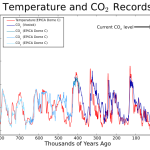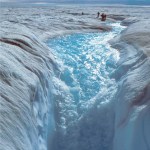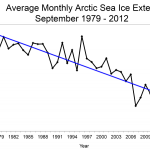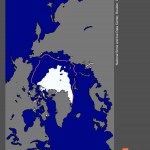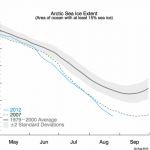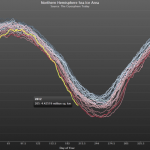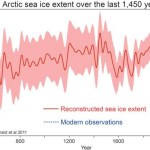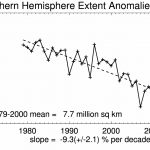cryosphere
A fascinating press release I want to pass along. At first I thought it was maybe good news in that rising sea levels would slow glacier drainage into the oceans but the affect is the opposite:
For the first time, researchers have closely observed how the ocean's tides can speed up or slow down the speed of glacial movement in Antarctica. The new data will help modelers better predict how glaciers will respond to rising sea levels.
Caltech's Brent Minchew (PhD '16) and Mark Simons, along with their collaborators and in cooperation with the Italian Space Agency (ASI), exploited four…
Dear Readers,
Find below an interesting press release I may as well share verbatim:
The rapidly melting ice sheets on the coast of West Antarctica are a potential major contributor to rising ocean levels worldwide. Although warm water near the coast is thought to be the main factor causing the ice to melt, the process by which this water ends up near the cold continent is not well understood.
Using robotic ocean gliders, Caltech researchers have now found that swirling ocean eddies, similar to atmospheric storms, play an important role in transporting these warm waters to the Antarctic coast—…
A commenter on the most recent edition of het's AWOGWN asks an interesting set of questions:
How would temperature data have been seen during the last 10,000 years prior to the peak of each of the previous Milankovich cycles? What caused the temperature to reverse course in those cycles and why would we not expect it to occur again this time?
First, here are the quick answers to those three questions, then some discussion. 1. It is not currently possible to resolve the temperature record that long ago to anything close to what we have today. 2. The cause of the temperature…
Here are a couple of great animations of the arctic sea ice volume over the satellite era.
(credit to Andy Lee Robinson, seen at Planet3)
While this is not news, I think the animations make two things very clear. One, is that anyone even giving the time of day to the notion that there is "nothing going on here, folks" when it comes to the arctic is in full-on head-in-the-sand denial or is a cynical liar. Two, is that contrary to the shrill shills who claim the IPCC et al are alarmists at best, exaggerating/misrepresenting the impacts of climate change at worst, the scientific…
Negative brownie points to anyone who feels it necessary to point out that penguins and polar bears do not cross paths in the wild! (Oops, I guess that would include me...)
(cartoon courtesy of Alex Hallatt, Creator of Arctic Circle cartoons)
NCSIDC has it's monthly analysis for September done and as expected, it ain't pretty.
Arctic sea ice extent averaged for September 2012 was the lowest in the satellite record, and was 16% lower than the previous low for the month, which occurred in 2007. Through 2012, the linear rate of decline for September Arctic ice extent over the satellite record is now 13.0% per decade, relative to the 1979 to 2000 average. The six lowest September ice extents over the satellite record have all occurred in the last six years. Compared to the 1979 to 2000 average ice conditions, the September 2012 ice…
Peter Sinclair has posted the second of a two part series documenting a trip he took with Mauri Pelto into the wilderness of the Pacific Northwest's Cascade range of mountains. Below are both part one and two of that series.
NSIDC has (preliminarily) announced the new record low ice extent for 2012.
On September 16, 2012 sea ice extent dropped to 3.41 million square kilometers (1.32 million square miles). This appears to have been the lowest extent of the year. In response to the setting sun and falling temperatures, ice extent will now climb through autumn and winter. However, a shift in wind patterns or a period of late season melt could still push the ice extent lower. The minimum extent was reached three days later than the 1979 to 2000 average minimum date of September 13.
This year’s minimum was 760,000…
POTSDAM – In 1845, Captain Sir John Franklin of the British Royal Navy led 128 men on two iron-plated steam ships, Erebus and Terror, into the Arctic, where they eventually disappeared. The voyage was the culmination of four centuries of failed attempts to navigate the Northwest Passage – a direct route from Europe to Asia across the Arctic Ocean – and remains one of the greatest tragedies in the history of polar exploration.
Today, a far greater Arctic tragedy is unfolding: the Arctic sea-ice cap is melting. Last month, an unprecedented new low was reached after decades of decline. Indeed,…
[Update: as pointed out in comments, this forecast is for a town called North Pole, Alaska, not the geographic north pole, or even the magnetic one...I must apologize for my haste and sloppiness. On the other hand, this incident has cleared up a number of long-standing structural engineering questions I have had about Santa's Workshop...]
I have never checked a site like Weather.com for the North pole before, so not really sure how much to trust this forecast. If it is accurate, we are looking at some pretty balmy weather up there for the next ten days and perhaps a late…
August sea ice extent in the Arctic this year was 640,000 square kilometers below the previous record set in 2007. It is also already a record monthly low for any month, though that record will not last as it is going to be broken this September when the lowest extent of the year is normally reached. In less than the last two months, multi-year ice declined by 33% and the oldest ice (over 5 years) declined by 54% (and that ice ain't coming back). While the unusual Arctic Cyclone probably had a noticeable impact on the evolution of this year's (still deepening) record ice loss, it…
His attitude might more resemble this below (very funny)!
(seen at P3)
I always say that living well is about choosing when to laugh and when to cry...
So as I warned about some weeks ago, almost all of the record lows are already broken in the arctic sea ice front. Neven seems to have the best discussions going, but he is on holiday for the next couple of weeks. You can see almost all (all?) of the scientific surveys of the various ice metrics in this single page jam packed with graphs here. It's a fantastic resource with links to all the original data sources. I found it at Neven's, not sure if he created it but many thanks are owed to whomever it was.
And we still have as much as 4 weeks of likely declines…
More melt excitement in the arctic. An unprecedented summer cyclone in the arctic has clobbered sea ice already tracking at record daily low area (58 days in a row now) and near record daily low extent measurements. As always, the go-to place for sea ice watching and discussion is Neven's:
Arctic storm part 3: detachment - Arctic Sea Ice.
Yes, the storm is weather, but it is unprecedented weather. It is hitting the ice during a pronounced, long term and accelerating downward trend. Though Wattsians will excuse any new records as the result of weather, what we are…
Some interesting goings-on in the cryosphere these days.
In this chart (click the link for an interactive, larger resolution version) from the cryosphere today we can see that we are on the 45th day in a row of daily record lows in sea ice area.
Note that this is area which is different from extent. Area refers to the actual ice cover, I am not sure of the details of how that is defined in practice, whereas extent refers to any ocean surface that contains 15% or more ice cover. Again, there will be technical details I am not familiar with for determining the edges of extent (e.g.…
This image has been going around the intertubes recently, I saw it first on Planet 3.0 and again on APOD. It is one of those interesting illustrations of large quantities that seems surprising or anti-intuitive either because you never thought about it carefully before or just because it is hard to get your head around sizes that are so far outside the realm of everyday experience.
Anyway, I am posting it because my wife insisted (a very unusual turn of events, considering the usual frown upon spending my non-work time on the computer!). When she saw it she became quite alarmed and thought…
Real Climate has done two posts recently that I thought would be served well by their juxtaposition. The first one highlights an early projection of global mean temperatures made by Jim Hansen in 1981.
The abstract for that paper contains this choice quote:
It is shown that the anthropogenic carbon dioxide warming should emerge from the noise level of natural climate variability by the end of the century, and there is a high probability of warming in the 1980's.
These are both things that have in fact happened. I think it is safe to call this a very successful early prediction of…
No, this is not Steve McIntyre finally coming out with his own multi-century proxy temperature reconstruction. Nor is it Anthony Watt's release of his surfacestations.org temperature reanalysis.
It is the take away figure from a recent paper in Nature by Kinnard et al that reconstructs the extent of arctic sea ice over the last 1450 years.
Tamino has a discussion of it here.
There is not really much to add to the thousand words that image conveys.
Well, it is that time of year again, the sea ice in the Arctic has reached its minimum extent.
(please note that the image above shows the August data, September's graphic is not yet available though it will look very similar)
So how's that "recovery" coming along? According to NSIDC, this year's September minimum is the second lowest in the satellite record.
Peter, over at Climate Crock of the Week, presents his latest video on that topic, a very sober and sobering placement of this year in its long term context:
Once again, the choice is between the "climate skeptics" and your lying…
Thingsbreak has a great overview of recent research on ice loss in the Antarctic (east and west) and Greenland.
For anyone who has had enough of the freedom vs responsibility of the press discussion (mandas?), perhaps there are some interesting bits in Thingsbreak's post to mull over.
I have posted on sea ice dynamics before (here), the two topics are not unrelated as stable ice shelves act as resistors to out flowing glaciers. Lost sea ice leads to faster glacial outflow which leads to thining ice sheets.
[Update: I have just observed out my window that it is snowing, I imagine this can…
